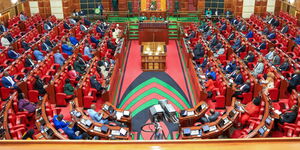The new Independent Electoral and Boundaries Commission (IEBC) team has little to no room for any niceties, as they set off a ticking clock immediately after their swearing in on Friday, June 11.
During the oath-taking ceremony the new IEBC Chairperson Erastus Ethekon accepted his responsibilities and pledged to serve Kenyans diligently, without fear, favour, or bias.
"I, Erastus Edung Ethekon, having been appointed the Chairperson of IEBC, do solemnly swear that I will at all times obey, respect and uphold the Constitution of Kenya and all other laws of the country," he stated.
In taking oath, Ethekon and his team comprising six other commissioners now face a series of urgent constitutional and legal tests, with top of the list being conducting 22 pending by-elections across the country.
These include by-elections for six parliamentary seats, one Senate seat and 15 vacant MCA seats.
Article 101(4) of the Constitution and Section 86 of the Elections Act stipulate that the IEBC is legally mandated to hold by-elections within 90 days of a seat falling vacant.
Since there was a gap in the IEBC since 2023, this mandate was crippled by the 90-day window was effectively triggered after the official swearing in of Ethekon and his team.
Beyond by-elections, another high-stake responsibility is the delayed boundary delimitation process, which is a constitutional requirement.
As per the law, electoral boundaries need to be reviewed every eight to twelve years. Since the last review was completed in 2012, the commission is alarmingly behind schedule, with just two years to the next polls.
In addition, the new IEBC must also clean up and audit the voter register and undertake a mass voter registration exercise while procuring new technology ahead of the next elections. This will include replacing the ageing KIEMS and BVRS kits, which have been central to the country's voting system.
The swearing in of the new commissioners came after President Ruto re-gazetted their appointment following the High Court's decision on Thursday evening to nullify an initial gazette notice, noting that it was null and void.
In their judgement, the three-judge bench comprising Justices Roselyne Aburili, John Chigiti, and Bahati Mwamuye, the court ruled that the original notice had breached conservatory orders issued on May 29.












